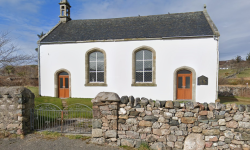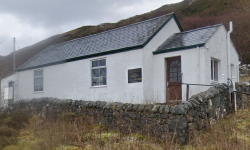John Mackintosh
Archibald Auld in Ministers and Men of the Far North wrote concerning him:
John Mackintosh, Crash, was a native of Edderachillis. He enlisted into the Reay Fencibles, and served in that corps in Ireland during the rebellion of 1798. While in the regiment a Methodist minister preaching was the means of bringing him and several others to enquire, ” What they must do to be saved?” And while John freely acknowledged his obligations to this minister, his views of Divine truth, when matured, became decidedly Calvinistic; and all the more so, as his training at that time, by one whom he believed to be a man of God, compelled him to study the doctrine of election and of the saint’s perservance more deeply than he might otherwise have done. He himself remarked that it was by secret prayer in his father’s sheep cot that he got clear of the Irish divinity.
When the Reay Fencibles were discharged, in the beginning of the present century, John Mackintosh returned to his native county, and received the right hand of Christian fellowship from Sheriff Macculloch, Dornoch, and others, eminent for gifts and godliness, among whom he soon occupied a distinguished place.
He was by and bye employed as a catechist in the neighbourhood of Inverness, and in the parish of Latheron in Caithness, and latterly of Farr in Sutherland – in all which his labours were highly prized, and continued to be so until the infirmities of age rendered him unable to carry them on. His natural disposition was cheerful and confiding, and in his hours of sunshine few could excel him in enlarging upon his favourite subject “the love of Christ, which passeth knowledge.”
While catechising in Latheron on one occasion, he became seriously unwell, and sent word to some friends whom he wished to see, that he believed his end to be near. George Mackay, Golticlay, on arriving, told him that the tree from which his coffin should be made was still growing, and that he should not leave the wilderness until he was better taught that Christ must increase, and he decrease.
He lived many years after this, making it the business of his life to die daily, and it seemed remarkable, in connection with his being so much in that exercise, that at last he had nothing to do but to die. His death was sudden, but his end was peace. It took place while the sacrament was dispensed in the neighbouring congregation at Strathy, where the brethren assembled acknowledged that a prince and a great man had that day fallen in Israel.
——————–
Hugh F Ferrier in his book Echoes from Scotland’s Heritage of Grace, gives the following anecdote concerning Mr Macintosh:
One day when he visited Archie Cook and when the minister’s wife had provided for them, he displayed his prophetic insight when the two men were alone. “She is pretty” said John. “Yes but she is so light.” said Cook. John’s response was, “She’ll be in heaven before yourself.” Mrs Cook became a deeply pious woman and predeceased her husband by a number of years.
In the sketch of William Sutherland, mention is made of a meeting he had with Mr Mackintosh in Farr.

